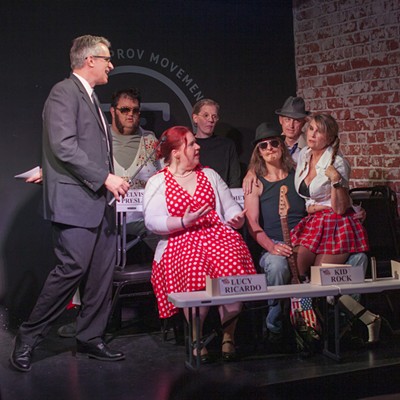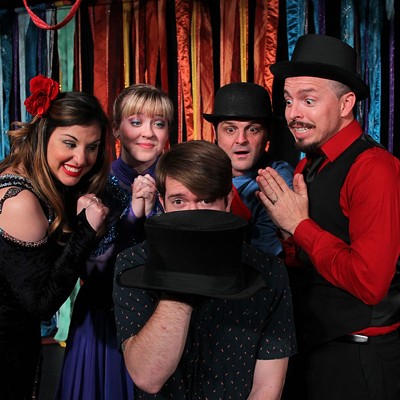Etcetera, the late-night branch of Live Theatre Workshop, has had several incarnations. As Michael Martinez, LTW's new executive director, says, "It's kind of lived up to its name."
Throughout the permutations, the eclectic late-night company has been a home for art that does not quite fit in elsewhere. Etcetera "supports new art and brings something that isn't really being offered other places in Tucson," says Martinez, who recently took the top job at LTW after many years with the company.
So when Christopher Johnson, Etcetera's highly regarded artistic director, announced in February that he was stepping down, fans of the quirky company were bereft.
Johnson had taken Etcetera in exciting new directions, moving away from sketch-comedy fare to become bolder, edgier. Recently, he'd gotten even more ambitious, staging productions such as Margaret Edson's Pulitzer Prize-winning Wit.
But he felt the need for a change.
"I've been at LTW off and on for about 10 years," Johnson says. "It's been who I am for a really long time; it's made me who I am. A lot of why I left Etcetera was that I wasn't my target audience anymore."
Instead, Johnson wanted to do serious drama. So he's joined two serious-minded companies: He signed on as an actor in Rogue Theatre's new ensemble, and as co-artistic director at Winding Road Theater Ensemble.
Before departing, Johnson will take his Etcetera bow in the summer production of Psycho Beach Party, a darkly humorous piece by Charles Busch, opening next week.
To replace Johnson, Martinez tapped one of the original Etcetera founders, Matt Walley, and his partner, Angela Horchem. After helping to get the late-night troupe off the ground, Walley left Tucson to earn a master's at Dell'Arte International School of Physical Theatre in California. There, he met Horchem.
But don't think that the new co-artistic directors will be picking up exactly where Johnson left off.
Walley and Horchem are "really into physical theater, ensemble-devised work," full of commedia dell'arte masks and movement, Horchem says. "Devised" theater, instead of starting from a polished script, develops a show through artists working together. "Sometimes, we start from a story; sometimes, we start from a character. Sometimes, we start from just the people in the room."
The first play under Etcetera's new banner will open in late September. While the company now has a different vision, its eclectic embrace of the new remains the same.
"Etcetera really supports new art," Martinez says. "It's always done that, and it will continue to do that."
Walley, Horchem and Johnson have something else in common besides Etcetera: All three are also members of the Rogue Theatre's new ensemble company. The Rogue, in a move unusual for Tucson, will be contracting its actors for an entire season.
"All of the 11 company members are in at least two plays in the season; some are in all five," says Rogue artistic director Cynthia Meier.
It's been a dream of Meier's since founding the Rogue seven seasons ago "to have a company of actors who would work together and train together throughout the season and create a true sense of ensemble."
In turn, the company members appreciate the regular work.
"Tucson has been kind of a transitory place for actors," Horchem says. She hopes the new structure can help "develop what's already here, and eventually keep some of that talent here."
Johnson agrees.
"I couldn't be more excited about it," he says. "The idea is to be training the ensemble together, to create an ensemble that could do really any show. It's one thing to work with a bunch of talented people, but to work with a bunch of talented people who can work together harmoniously? That's danger sauce."
Johnson won't leave directing behind. Early in the fall, he's directing Stephen Karam's Speech and Debate, the season opener for Winding Road Theater Ensemble, where he is now co-artistic director with Glen Coffman.
In another big change, Winding Road has found a home at the Beowulf Alley Theatre for its entire season.
"I went out and got them," says Beowulf Alley Theatre Company's new artistic director, Michael Fenlason. Knowing that it's hard for companies to find a place both to rehearse and perform, Fenlason offered the troupe space at its downtown theater. "We want to be a space like that for theater companies."
Fenlason, at Beowulf for four months, plans some changes to Beowulf, too.
"We're going to do a little normal, and we're going to get a little weird," he says. "We're trying to do more multimedia, multiplatform shows."
Later this month, a Beowulf subproject called The Next Theatre will debut Joan Is Burning, a piece that is partly filmed, partly performed.
"Can theater really ignore technology?" Fenlason asks. In Joan Is Burning, "one of the characters is literally her phone. ... She talks so much to that, relates so much to that, that it's almost another person."
At Studio Connections, Robert Encila has called a temporary halt to the daVinci Players, a community theater group that evolved out of his classes for teenagers.
"DaVinci Players went on to really consume my energy," he explains. "So I went away from my original mission, which was working with kids and teens."
The troupe will operate on a smaller scale for benefit performances, but Encila will concentrate on the theater classes. He's "really aiming to grow the current programs."
Encila looks back fondly on past daVinci productions like the critically acclaimed Man of La Mancha.
"DaVinci Players sort of was an unexpected, wonderful thing," he says. "It was fun while it lasted."
And the change has its advantages. "With my suddenly free evenings, I'm looking for opportunities to perform," he says. He's already lined up a role in Borderlands' Bruja, a new play by Luis Alfaro opening next March.
Balancing the loss of daVinci, Sheldon Metz and John Vornholt have founded a brand-new company, the Tucson Alliance of Dramatic Artists, or TADA.
Metz, though himself a set designer, intends to focus on minimalist readings of original works.
"A set, good or bad, can sometimes distract," he says. He envisions "a simple format that can be utilized anywhere—a furniture store, music store, library, museum, anything."
TADA's first production, two nights of original play readings in May, was held at Art Gallery/Stone Dragon Studio.
With hopes of presenting a new play in September, the TADA directors are now looking for original scripts. (To submit a script for TADA, visit www.thedrektor.com.)
A second Metz-Vornholt project, Murder Mayhem, is "180 degrees from TADA." It's a murderous dinner-theater show at the Hotel Congress, in which guests must vote on who did the bloody deed.
"This is pure fun," Metz says. "The discipline you need in presenting a play and the discipline for this is similar, but here, you're free to explore and experiment."










